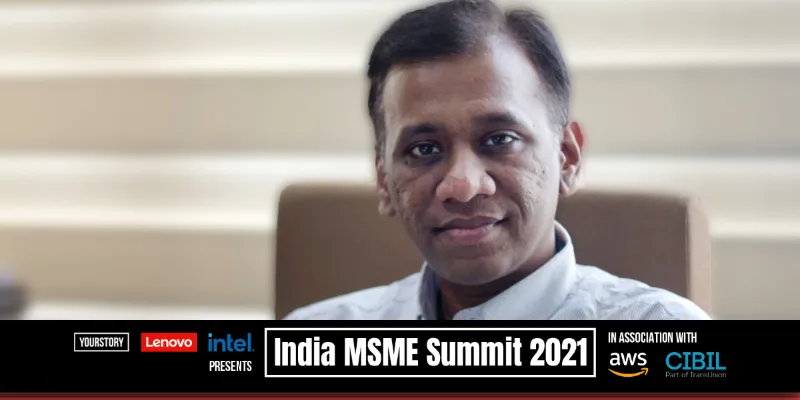How this entrepreneur leveraged technology to build a Rs 227 Cr turnover logistics company
Established in 2004, Bengaluru-based logistics company Sequel Logistics has nearly 6,000 clients, including prominent jewellery retailers like Titan, international and domestic banks, as well as pharma and diagnostic companies.
Rajkumar S was introduced to the Indian logistics industry in the early part of the decade that marked the beginning of the 21st century. After completing mechanical engineering from Chennai and PGDM from IIM-Calcutta, he joined as a management trainee with Titan, a Tata Group company that manufactures and retails luxury and lifestyle products.
He was involved in the areas of demand planning and forecasting, inventory control, production planning and sourcing, initially at Titan and subsequently at Madura Garments, an Aditya Birla Nuvo company.
However, the turning point in his life came around the year 2004 when Titan was looking to appoint a third-party logistics company to operate and manage their factory’s store operations. Rajkumar says that his past experience in the supply chain domain prompted him to take a dive into entrepreneurship.
Rajkumar launched Sequel logistics and commenced operations in April 2004.
“We started our first project in the Hosur watch division, with 76 people. The operations involved handling the raw material, semi-finished and finished goods warehouse, and taking accountability for the physical and book inventory, JIT assembly line-feeding and finished goods dispatch.”
Gradually, Sequel started growing, adding several clients to its kitty. Today, it has 6,000 clients including prominent names across the precious cargo and life science logistics sectors.
In the domestic Indian market, Sequel covers more than 385 cities and towns and reaches over 5,000 pin codes on a regular basis. The international operations division services more than 120 countries. Rajkumar stated that the company clocked Rs 227 crore revenue in FY21.
Identifying the need gap and fulfilling it
Rajkumar says that in the initial years of client interaction, he saw a gap in the logistics industry. “There was a need gap in the market for a niche and specialised logistics player in India.”
“We immediately realised that the skill sets, capabilites, infrastructure and the culture required for ‘critical logistics’ is very different from the supply chains of generic products.”
Everything at Sequel, right from the beginning, is built for and built around managing critical and specialised products like high-value jewellery and temperature-sensitive life science products, which makes it a differentiated player in a market that houses the likes of Delhivery, Shadowfax, Locus, LetsTransport, etc.
Rajkumar was aware that he was venturing into unexplored territory, and he faced numerous challenges.
“Today, the market knows the difference between a specialised logistics player and a generic logistics player, but that was not the case 16-17 years back,” says Rajkumar.
"Initially it was a challenge to convince the logistics managers of several companies, especially when the concept was new and when Sequel was a small and whether we could manage such complex and large-scale operations seamlessly," recalls Rajkumar. He says that he and his team had to persevere in terms of convincing their potential clients and would also demonstrate how leveraging Sequel’s supply chain management system will add value to them.
“This is how we built the business brick-by-brick,” he says.

Leveraging technology
Leveraging technology is at the helm of all the activities that Sequel does. Rajkumar says that technology has become important across all elements of the business, but it is particularly of great use in the logistics industry because it is “transaction-heavy” and “customers are spread across different geographies.”
The company has in-house developers and IT systems that have put together a technology platform called SEQUEL247 - present in both web (www.sequel247.com) as well as in mobile app. The application integrates its internal processes with the end customer delivery. Clients can seamlessly book a pickup request, track shipment, get notification alerts, receive invoices, and even make payments using Sequel247.
“Internally, Sequel has migrated all its processes of recruitment, attendance, travel, purchase and inventory of assets, consumable and 3rd party services onto the Sequel 247 platform.”
Moreover, this complex system, which makes operations efficient, is hosted on Amazon’s on-demand, cloud-based Amazon Web Services (AWS) system.
India’s cloud infrastructure is growing exponentially. In fact, the market was valued at Rs 30,140 crore in 2020 and is expected to grow at a CAGR of around 29 percent to reach Rs 1,16,923 crore by 2025.
“AWS is an integral part of the entire operating system because it helps in ensuring that there is no downtime, no security breach. Moreover, it provides good service, good speed and is a commercially viable platform.”

Looking back and towards the future
Sequel has come a long way since its inception in 2004. The company has evolved as much as the industry itself. Commenting on how the company has tried to keep with the times, Rajkumar says, “We keep our ears on the ground to understand what our clients want and what changes are happening in our ecosystem.”
Furthermore, factors such as improved transportation infrastructure and technology have also played a part in revolutionising the Indian logistics industry, which is expected to grow at a CAGR of 10.7 percent between 2020-2024.
Going forward, the company is looking at working on projects related to green logistics and sustainability. Rajkumar says that Sequel will very soon migrate a bulk of its fleet to electric vehicles or EVs to make their operations environment-friendly.
COVID-19, which brought the entire world to a standstill, impacted the logistics market with supply chains disrupted severely. “The pandemic has exposed certain constraints and issues that we have to deal with now,” he says.
Rajkumar says that the company is compelled to work on strengthening the inter-city movement of cargo since disruption in the commercial aviation sector has forced it to look for alternatives.
These two areas will be the focal points of the company in the coming fiscal years.
Edited by Megha Reddy









